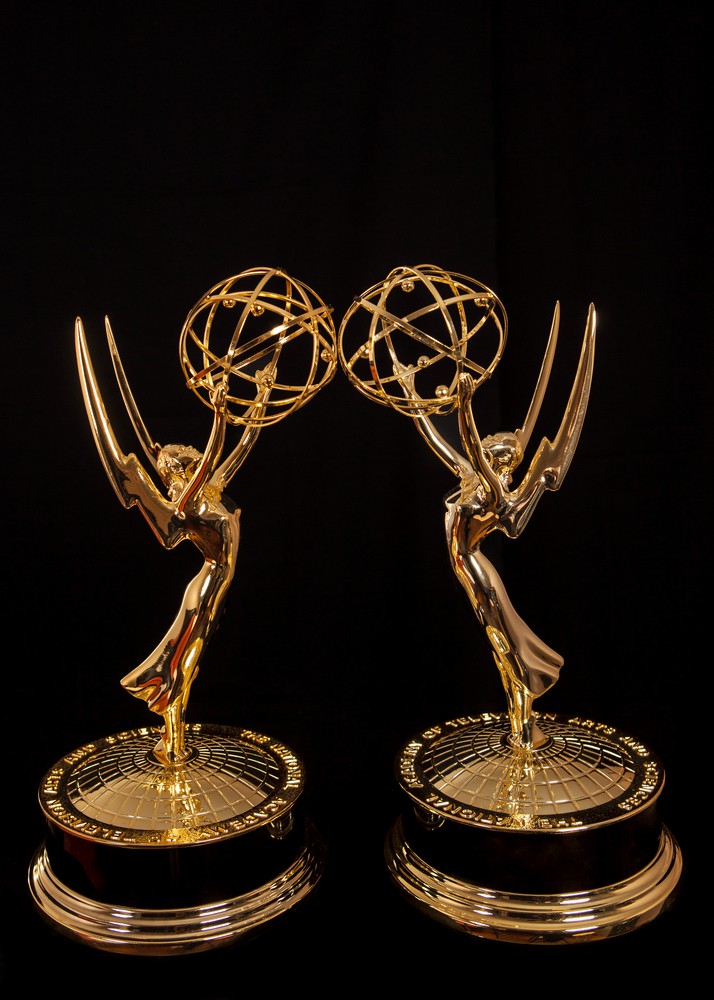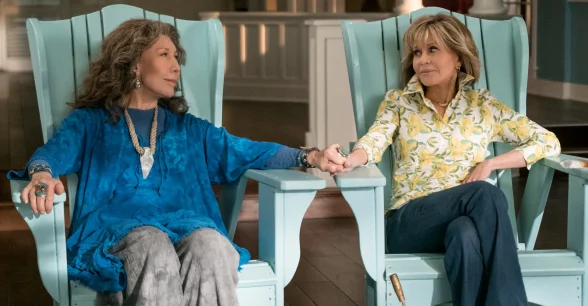Shaping Awards Season, One Disabled Story at a Time
It’s awards season again. Oh wait, nevermind…
Just as the climate crisis makes spring feel like winter and summer feel like “The End Times,” the writers’ strike, the actors’ strike, and years of a global pandemic have shifted the once-predictable entertainment industry milestones.
So with Emmy nominations released but the awards show postponed, what can categories, contenders, and ceremonies tell us about the state of disability representation in television and film?
Let’s rewind to March 2023. I was sitting on my friend’s living room floor, yelling at the TV.
“GIVE HIM THE MIC.”
The cinephiles who packed the couches and kitchen chairs around me checked the scores on their Oscar nominations sheets and grabbed more chips, but they hadn’t watched all of the 2023 live action shorts. They didn’t know what I was fuming about.
“GIVE HIM THE MIC.”
On stage in Los Angeles, An Irish Goodbye had just won the Academy Award for Best Live Action Short Film. I started yelling when director Tom Berkley stepped in front of lead actor James Martin. Instead of giving Martin a chance to speak, Berkley was trying to lead the assembled celebrities in a round of “Happy Birthday” for the actor.
On that day, an Oscar winner with Down syndrome could have addressed Hollywood power brokers and the broadcast audience. Instead Martin’s colleagues infantilized the radio personality, Starbucks employee, and actor with a gimmick by literally grabbing the mic. By the time the half-hearted chorus had concluded, the team from Belfast had been ushered from the stage.
As predictions for the Emmys wax and wane, I can’t help but wonder what opportunities disabled creators will have to take the mic or claim the spotlight. Television is even more in need of disabled voices and disability-led storytelling than film. In an analysis of film and TV, Nielsen data suggest that television series account for only 16% of content that is “inclusive of disability.” Whether or not those shows accurately portray disabled experiences is another question.
At least in on-screen roles, the rise of streaming may have contributed to a modest boost in disability representation. Netflix alone has launched several shows with disabled leads in recent years. However, despite the hype, I could never get behind Atypical because it didn’t cast an #ActuallyAutistic actor.
Special offers a more promising path forward because it was written by and stars Ryan O’Connell, who found comedy in a fictionalized account of his experiences as a gay man with cerebral palsy. Neither show has won big at the Emmys or other awards and both focus on wealthy white folks.
Maybe it’s because of this narrow range of lived experience that I’m drawn to disabled characters who have recurring rather than main roles. Last year, Sex Education won an International Emmy for best comedy series. But it also deserves recognition for a nuanced take on disability and intimacy.
In season two, the ensemble cast of horny teenagers is joined by Isaac, an artist with a spinal injury. Did I mention the character was rewritten to reflect the experiences of the disabled actor who was cast to play the part? There’s so much to love about Isaac and I’m not the only disabled viewer to be obsessed. He’s snarky and self-aware and plays with the assumptions of his neighbours at the trailer park.
The Emmy-winning season three of Sex Education includes scenes that chronicle two types of intimacy in Isaac’s life. First, his relationship with his brother—who is also his caregiver. Second, Isaac’s feelings for Maeve, the brilliant and rebellious girl next door.
Although teeth-brushing and toast-making might not be the reason the show attracted the International Academy of Television Arts and Sciences’ attention, it’s refreshing to see that interdependence isn’t edited out of the plot.
Instead, Isaac subverts stereotypes about disability by flirting (“Help! I dropped a thing!”) and coaching his crush on how to make out. One reason this character rings true is that there’s a disabled writer in the Sex Education writers’ room.
Representation, not just on screen but in the writing process, is key to getting disabled stories right. Where I’m from in Canada, the Accessible Writers’ Lab aims to increase disabled participation in screenwriting. What does a virtual writers’ room look and feel like? How can teams of creators reduce the burden of representation in storytelling? Six disabled writers worked with a local film festival and national funders to answer these questions.
Stateside, the Inevitable Foundation’s Letter to Hollywood points out the discrepancies between working as a disability consultant and being hired as a writer on a project. Even though writers are currently fighting for fair compensation, a disability consultant would earn just 1% of what a staff writer made before the strike.
From Netflix to the prestige TV that the Emmys favour, recent successes of disability representation are all about the subplots. Among this year’s Emmy nominations, Abbott Elementary is a prime example. The show finds heart and humour amid entrenched racism and educational bureaucracy. It also acknowledges that supports for disabled students are among the many victims of budget cuts.
Not only can the show expose the absurdity of cobbling together a ramp while lacking a wheelchair accessible desk, it pokes fun at hearing folks’ fascination with ASL. Abbott Elementary has my vote for both Outstanding Comedy Series and all of the acting talent because it creates a world where the strength of school leaders and the insensitivity of do-gooders can coexist with laughable results.
I’m still waiting for complex, believable disabled characters to move from friend or guest to starring roles, but for now I’ll celebrate how Abbott Elementary integrates disability advocacy into a whirlwind of public services, professional goals, and personal relationships. That feels like real life.
Unfortunately, the remainder of this year’s Emmy nominations confirm that not enough disabled talent is shaping the shows we watch, talk about, and anticipate. The solution isn’t just research reports or advertising campaigns or awards. It’s something that belongs at Abbott Elementary and in any elementary school classroom: speculative fiction.
Let’s go back to story time on the carpet. Let’s imagine for a moment what film and television productions might look and sound like if they included an abundance of disabled experiences on our own terms.
What about designing awards ceremonies and nominations processes that combat ableism? It’s about more than having a ramp to the stage. It’s about making sure the ASL interpretation isn’t excluded from the broadcast. It’s about providing plain language summaries of each of the award categories. It’s about making sure Academy websites and entertainment reporting can be navigated by screen readers and other assistive technologies.
As we imagine a new future for our favourite shows and all the stories that have yet to be written, cast, or produced, let’s savour how a truly inclusive awards season would feel as disabled audiences, creators, and dreamers. Imagine an inclusive awards season. What would it look, feel or sound like to you? Feel free to share your thoughts in the comments!
About Rooted In Rights
Rooted in Rights exists to amplify the perspectives of the disability community. Blog posts and storyteller videos that we publish and content we re-share on social media do not necessarily reflect the opinions or values of Rooted in Rights nor indicate an endorsement of a program or service by Rooted in Rights. We respect and aim to reflect the diversity of opinions and experiences of the disability community. Rooted in Rights seeks to highlight discussions, not direct them. Learn more about Rooted In Rights



